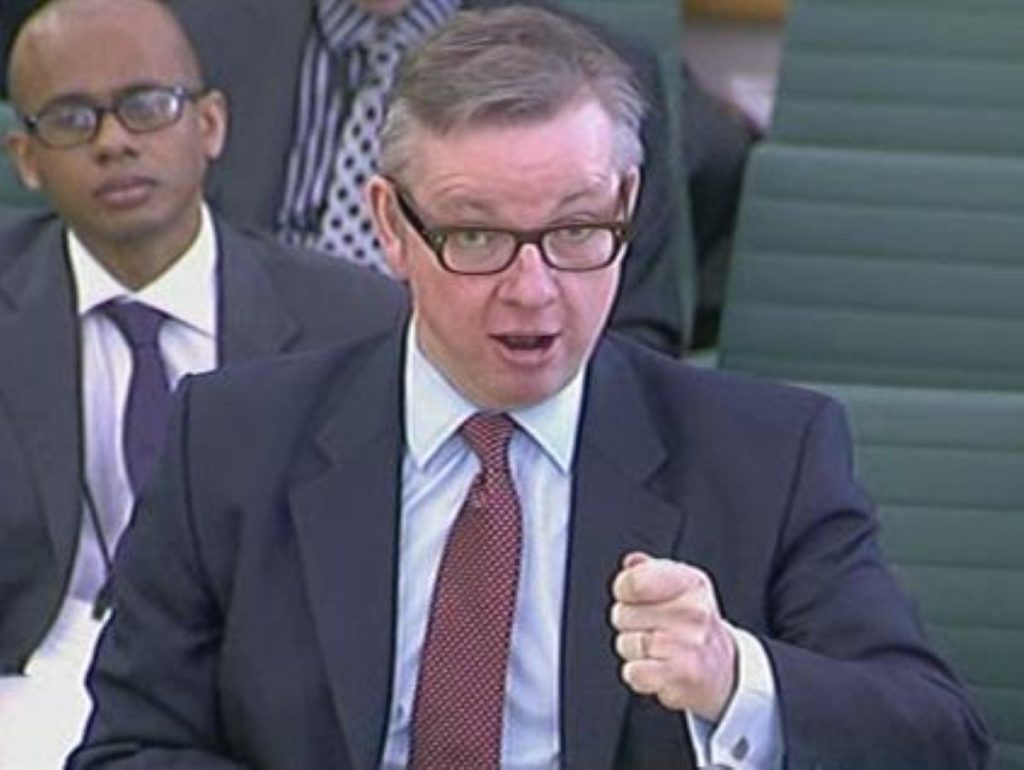Leading by example: Gove bullies MPs over bullying allegations
Michael Gove has shrugged off allegations that his special advisers bullied civil servants in his department, in a bitterly fought committee session which proved frustrating for both sides.
The education secretary was recalled to the education committee after originally denying any knowledge of the allegations in an appearance before MPs on January 23rd.
Further complaints about the attitude of Gove's special advisers, Dominic Cummings and Henry de Zoete, have subsequently emerged, but Gove resolutely stood by his aides this morning.
"Special advisers are committed and idealistic individuals who are committed to pressing ahead with the reform programme," the education secretary, who the ministerial code makes clear is responsible for the behaviour of his special advisers, told MPs.


"Yes, sometimes there are criticisms made of them and me by people who wish to stand in the way of the reform… special advisers sometimes come into the firing line because they are energetically prosecuting the government's agenda."
A tribunal had taken place at the beginning of the year following the complaints of a specific employee in the Department for Education's (DfE) communications department that she was forced to work in a "macho culture of intimidation, favouritism and 'laddism'".
Communications chief James Frayne had allegedly said at one meeting: "Wind your neck in, you're acting like a t***." The complainant had said the standard responses to dissent to the changes being pushed through by Gove and his team were usually along the lines of "f*** it", "what the f*** do you mean?" and "let's just f***ing do it".
The department's permanent secretary, Chris Wormald, said the DfE had apologised to the staff member concerned but rejected the specifics.
"There were elements in the reorganisation of the communications department that took place where the department had not lived up to the standards that it sets itself," he said.
"In particular, the communication of how the changes were to be carried out and their effect on one particular individual was not handled well… What the department does not admit was any of the wider aspects of the claim relating to bullying, harassment or intimidation."
He dismissed concerns about the £25,000 cost of the tribunal, offsetting it against the overall reduction to the department's budget from headcount cuts.
Subsequent reports cited the aggressive behaviour of Gove's spads to journalists. The Independent's education correspondent Chris Cook came into the firing line in a phone call to the newspaper's education editor, Richard Garner, who was told he should "speak to Chris Cook about a good therapist".
Gove refused to address that claim, accusing Labour MP Bill Esterson of pursuing an "inappropriate line of questioning". He did not confirm or deny the quote but merely stated: "I think their reporting in a number of areas has been wrong."
Aggressive briefing against former education minister Tim Loughton which emerged in a Spectator article also raised eyebrows. Loughton was described as a "lazy incompetent narcissist obsessed only with self-promotion".
Gove said he had asked his special advisers whether they were the source of the quotes and confirmed they had denied responsibility.
The committee hearing was dismissed as an "embarrassing farce" by Conservative MP Chris Skidmore, who made clear he had opposed the session taking place at all.
Labour MPs' attempts to uncover more information about Gove's ignorance of the case appeared justified, however, after the permanent secretary conceded it would have been possible to come to a "different judgement" on the issue.
He accepted his decision not to inform Gove of the original complaint that led to a tribunal was one of interpretation, but stood by his original decision to keep Gove in the dark.
"The standard practice we have is we do not inform ministers about either the existence of substance of grievance cases within the department," Wormald explained.
"The grievance was a wide-ranging grievance, mainly against the department and its management in which a special adviser also featured. In that case, there is clearly a judgement to make, because as you rightly say the secretary of state is responsible for the conduct of special advisers."
Labour MP Ian Mearns said: "What the department has decided to do in this particular case really does seem to fly in the face of what is written in the ministerial code."
Gove said he did not want to "micromanage personnel matters" and defended Wormald's decision, saying: "I couldn't be omniscient."












